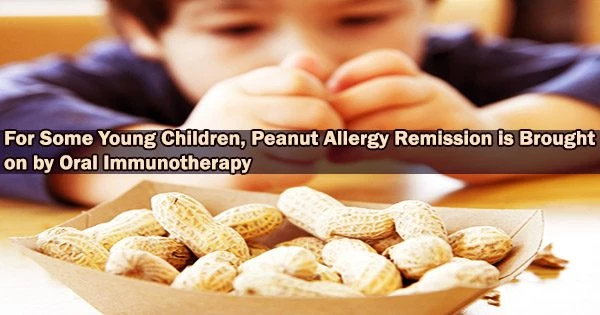Giving extremely allergic children between the ages of one and three years old peanut oral immunotherapy was found to safely desensitize the majority of them to peanuts and cause peanut allergy remission in one-fifth of them, according to a clinical experiment supported by the National Institutes of Health. For 2.5 years, a daily oral dose of peanut flour was administered as immunotherapy.
Six months after finishing immunotherapy, remission was determined to be the ability to consume 5 grams of peanut protein, or 1.5 tablespoons of peanut butter, without experiencing an allergic reaction.
The likelihood of remission was highest in the youngest children and those who began the study with lower levels of peanut-specific antibodies. The results of the trial, called IMPACT, were published today in the journal The Lancet.
“The landmark results of the IMPACT trial suggest a window of opportunity in early childhood to induce remission of peanut allergy through oral immunotherapy,” said Anthony S. Fauci, M.D., director of the National Institute of Allergy and Infectious Diseases (NIAID), part of NIH. “It is our hope that these study findings will inform the development of treatment modalities that reduce the burden of peanut allergy in children.” NIAID sponsored the trial and funded it through its Immune Tolerance Network.
Nearly 1.5 million people in the United States under the age of 17 suffer from a peanut allergy, which affects about 2% of youngsters. For these kids, who are often lifelong peanut-allergic, the risk of a potentially fatal allergic reaction to an unintentionally consumed peanut is substantial.
Because oral immunotherapy has the capacity to alter the immune system, the IMPACT trial investigators reasoned while planning the study that administering peanut oral immunotherapy early in childhood, when the immune system is still forming, might alter a child’s immune response to peanuts.
The landmark results of the IMPACT trial suggest a window of opportunity in early childhood to induce remission of peanut allergy through oral immunotherapy. It is our hope that these study findings will inform the development of treatment modalities that reduce the burden of peanut allergy in children.
Anthony S. Fauci
It was demonstrated in two earlier studies that peanut oral immunotherapy may be administered to very young children without risk and produce therapeutic results. The IMPACT trial was conducted at five academic medical sites in the United States with about 150 kids between the ages of 1 and 3 years.
Only kids who experienced an allergic reaction after consuming less than half a gram of peanut protein (about 1.5 peanuts) were allowed to participate in the trial. The kids were given either flour containing peanut protein or a placebo flour that looked similar at random.
To help disguise their flavor, the flour were combined with meals like pudding or applesauce. Until all the data were collected and the trial visits were over, no one except a site pharmacist and a site dietitian knew whether a patient had received peanut flour or a placebo.
The youngsters in the treatment group consumed steadily increasing daily amounts of up to 2 grams of peanut protein over the course of a 30-week period, which is about comparable to six peanuts. For a further two years, the kids continued to take their daily amount of peanut or placebo flour.
The youngsters next participated in an oral food challenge, receiving peanut protein in progressively higher doses up to a cumulative maximum of 5 grams. After stopping their medication, they abstained from peanuts for six months.
The youngsters next undertook a second oral meal challenge that contained 5 grams of peanut protein, or around 16 peanuts. To confirm that they could consume peanuts without experiencing an allergic reaction, those who did not experience an adverse reaction during the challenge were later given 8 grams of peanut butter, which is equal to 2 tablespoons, on a different day.
Compared to only 2% of the children who had gotten the placebo flour, 71% of the children who had received peanut flour had been desensitized to it by the conclusion of the treatment period. In the first oral food challenge, desensitization was indicated by the ability to consume 5 grams of peanut protein without experiencing an allergic reaction.
After receiving peanut flour, 21% of kids could eat 5 grams of peanut protein during the second oral food challenge without experiencing an allergic reaction, indicating that they were in remission six months after finishing therapy. In contrast, only 2% of kids who got placebo flour at that time were in remission.
Researchers discovered that younger age and having lower levels of immunoglobulin E antibodies at the beginning of the experiment were predictive of whether a kid will experience remission.
After having access to the study data, the researchers conducted an analysis and discovered an inverse association between age at trial entry and remission, with remission occurring in 71% of 1-year-olds, 35% of 2-year-olds, and 19% of 3-year-olds.
The majority of dose-related responses were mild to moderate in severity, while virtually all of the children who received peanut flour experienced them during therapy. Over the course of the 2.5-year treatment period, epinephrine was administered to 21 kids for 35 moderate reactions to peanut flour.
The Immune Tolerance Network conducted the trial under the leadership of A. Wesley Burks, M.D., and Stacie M. Jones, M.D. Dr. Burks is chief executive officer of UNC Health, dean of the UNC School of Medicine, and vice chancellor for medical affairs at the University of North Carolina at Chapel Hill. Dr. Jones is a professor of pediatrics at the University of Arkansas for Medical Sciences and Arkansas Children’s Hospital in Little Rock.





